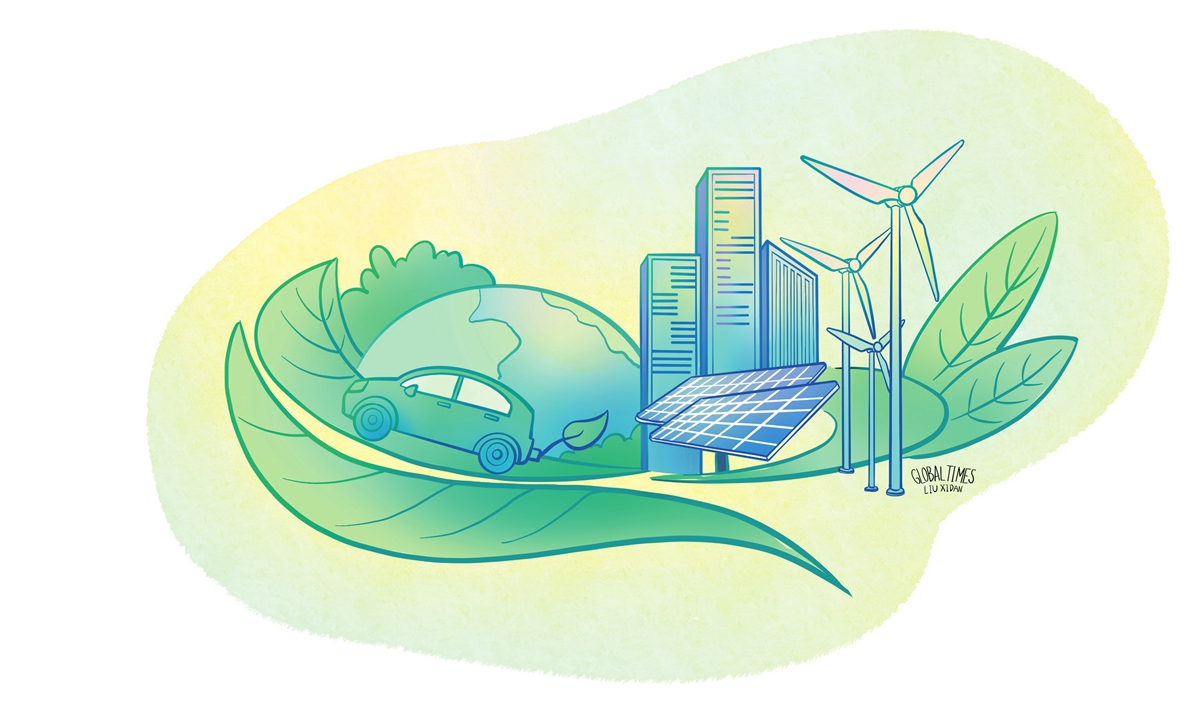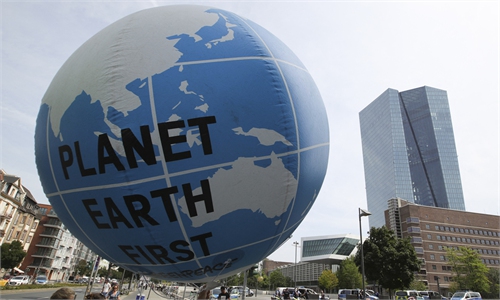
Illustration: Liu Xidan/GT
The 2023 UN Climate Change Conference, also known as the 28th session of the Conference of the Parties (COP28) to the United Nations Framework Convention on Climate Change, started on Thursday in Dubai, United Arab Emirates, as scheduled.
Reports say that countries will face the first review of their progress toward the Paris Agreement, a landmark international treaty on limiting carbon emissions that was signed at the COP21, about eight years ago. It remains to be seen whether the outcomes of the conference in Dubai, as well as future actions, can pull humanity back from the climate cliff.
One of the fundamental prerequisites for human survival is a suitable temperature on the Earth's surface. Extreme temperatures, either too low or too high, can have catastrophic consequences for human civilization. While science and technology could offer the possibility of subterranean living, akin to what is depicted in the Chinese movie, The Wandering Earth, the question remains whether the progress in these fields can accommodate the survival of nearly 10 billion people worldwide underground. Moreover, relocating the civilized world underground would severely impede the progress of existing civilization.
In July of this year, UN Secretary-General António Guterres declared that the "era of global warming" was over, and the "era of global boiling" has arrived. A report issued by the Intergovernmental Panel on Climate Change in 2022 confirmed that human-induced climate change, including more frequent and intense extreme events, has caused widespread adverse impacts and related losses and damages to nature and people, beyond natural climate variability.
The Emissions Gap Report 2023, issued by the UN Environment Programme (UNEP), noted that greenhouse gas emissions reached a new high in 2022. In September 2023, global average temperatures were 1.8 C above pre-industrial levels. Even in the most optimistic scenario considered in this report, the chance of limiting global warming to 1.5 C is only 14 percent, and the various scenarios leave open a large possibility that global warming exceeds 2 C or even 3 C. In October of 2022, the UNEP issued a report saying there's "no credible pathway to 1.5 C in place" today. In other words, pulling humanity back from the edge of the climate cliff may be nothing more than a fantasy.
As early as 2019, Inger Andersen, UNEP's executive director, warned that "our collective failure to act early and hard on climate change means we now must deliver deep cuts to emissions - over 7 percent each year."
Taking climate action is a global issue that cannot be addressed by a single country alone. The primary obstacle to achieving sustainable development goals by 2030 lies in the unreasonable existing global governance system. The "each for itself" approach in terms of national governance and regional group development prioritizes individual and local interests over global and long-term interests for the well-being of mankind.
Developed countries, with their early industrialization and significant greenhouse gas emissions, have emerged as winners in the global geopolitical landscape. Anyone who suggests "I can develop, but you cannot," or denies the obligations that must be fulfilled in global emission reduction today due to the benefits derived from past extensive greenhouse gas emissions, only shows a typical manifestation of ecological/environmental colonialism. This is a major reason why sustainable development goals are stuck in a predicament.
Developed countries should fulfill commitments by addressing their own emission reduction issues seriously, while providing climate adaptation funds, as well as compensation for loss and damage, to developing countries. The commitment to provide at least $100 billion in climate assistance should be fully realized as soon as possible.
Developing countries, within the framework of the UNFCCC, should make efforts to achieve ecology transformation from a political perspective while seeking effective pathways to tackle climate change. This includes utilizing modern technology to implement their national contributions on climate protection, developing detailed plans to address climate challenges and achieving sustainable development through concrete actions.
At the United Nations level, governance models must be reformed to ensure the achievement of climate change goals and to ensure reasonable compensation payments from developed countries to low-emission countries.
"We are trapped in a deadly cycle," Guterres said when talking about the ever-worsening climate change earlier this week. To break the deadly cycle of global warming, global action, with the responsibility of major countries, the participation of smaller countries, and the accountability of every individual, is urgently needed.
The author is a professor at the Institute for Sustainability of Huzhou University and a researcher at the Budapest Centre for Long-term Sustainability. opinion@globaltimes.com.cn


